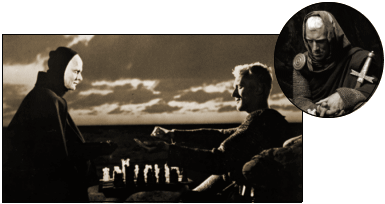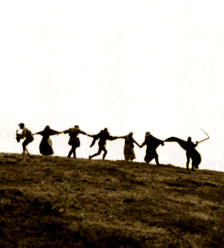
as long as I resist you, I live…
In Bergman’s classic 1957 allegory, The Seventh Seal, a disillusioned knight returns from the Crusades to a Sweden under the grip of the Plague, only to encounter the personification of Death who has come for him. He challenges Death to a game of chess, played for his life. As audience, we know the game is a lost cause, among other lost causes in the story – the Crusades; the Plague; his attempts to evade Death. What brings this existential drama to mind? It’s the current chess game between the pharmaceutical industry and those clamoring for data transparency: the EMA data dump; the Abbvie suit; the Alltrials Gambit; the PhRMA·EFIA counter; the Pipeline sacrifice; the RIAT squad; the Black Box Warning; the Direct-to-Consumer Ads. Back and forth, the players make strategic moves trying to gain the field.
 But unless I’m completely missing something, the only reason to keep clinical trial data private is so it can be misrepresented. And the only reason to continue to keep older clinical trials private is to hide the fact that they have already been misrepresented or unpublished. For that matter, the only reason to publish a study in an academic journal is to accurately represent the results to practicing physicians. And the only justification for using the tools of data analysis is to extract the meaningful parameters that allow clinicians to evaluate and compare alternatives. And yet, at every level of the clinical trial process, the pharmaceutical industry has found a way to manipulate the conduct of these trials in their favor without committing outright fraud – from authorship, to design, to analysis, to presentation, abetted by physicians and scientists at the highest levels. The academy has been breached.
But unless I’m completely missing something, the only reason to keep clinical trial data private is so it can be misrepresented. And the only reason to continue to keep older clinical trials private is to hide the fact that they have already been misrepresented or unpublished. For that matter, the only reason to publish a study in an academic journal is to accurately represent the results to practicing physicians. And the only justification for using the tools of data analysis is to extract the meaningful parameters that allow clinicians to evaluate and compare alternatives. And yet, at every level of the clinical trial process, the pharmaceutical industry has found a way to manipulate the conduct of these trials in their favor without committing outright fraud – from authorship, to design, to analysis, to presentation, abetted by physicians and scientists at the highest levels. The academy has been breached.
The argument from the PHARMA side is that the kind of restrictions that data transparency brings will destroy the profitability of the pharmaceutical enterprise, and new drug development will grind to a halt. In that logic train, profitability is directly linked to being able to inflate drug efficacy and minimize drug toxicity. So perhaps my analogy to Bergman’s allegory is not so forced after all – a fight to the death where the integrity of Medicine is pitted against the promise of future treatments, played out on an illusionary game·board with moves and counter·moves, gambits and sacrifices. And nowhere are the apocalyptic aspects of this conflict more apparent than in psychiatry, often seen as being at the edge of medicine.
 Bergman’s title comes from the Book of Revelations and the opening of the seventh seal at the end of days, heralding a day of reckoning when everything is made right – the suffering of the martyrs redeemed, the punishment of the wicked meted out, and the fate of the righteous assured. In the film, the Knight finally transcends these cataclysmic matters with a surprise country picnic of milk and wild strawberries, and an act of kindness, diverting Death’s attention while an innocent family escapes the Plague. Having found this small peace, the story ends with an iconic danse macabre as Death wins and leads the Knight’s entourage away.
Bergman’s title comes from the Book of Revelations and the opening of the seventh seal at the end of days, heralding a day of reckoning when everything is made right – the suffering of the martyrs redeemed, the punishment of the wicked meted out, and the fate of the righteous assured. In the film, the Knight finally transcends these cataclysmic matters with a surprise country picnic of milk and wild strawberries, and an act of kindness, diverting Death’s attention while an innocent family escapes the Plague. Having found this small peace, the story ends with an iconic danse macabre as Death wins and leads the Knight’s entourage away.
On the game·board of his art, Bergman reframes the apocalyptic final judgement day according to John of Patmos and the heroic illusions of the crusading Knight Errant, down·sizing them to simple moments in the life a person – an unexpected gift, a spontaneous moment of giving. It’s a poignant message about meaningful priorities from a timeless film, but is it pertinent to something so convoluted as the gathering storm swirling around data transparency in the clinical trials of medications? where the health of millions and a treasury of billions seems to be at stake? a problem presenting more like the Armageddon of biblical prophecy than a quiet encounter with a bowl of milk and some wild strawberries.
I wrote this in the spaces while I was on the road over the long weekend. I can see that I got a bit further into my thoughts about Bergman’s message than I intended and strayed from my point- I guess an old man’s perogative. There were two main things, though, that brought this film to my mind. The first was the timing of the story. The Knight, Antonius, was returning from the crusades, a failed endeavor. The Champions left Europe filled with the spirit that the justness of their cause would carry them to sure victory, wasting their fortunes and adult lives on a failed cause and they returned at the end of an era that lives on in our legends, but at the time was a disillusionment for all. I see the pharmaceutical giants in the same boat, at the end of an era but trying to keep it alive. We want data transparency to keep them honest. Their counter-proposals are to set up independent boards to see if applicants for data access are worthy to use their data for science projects. They’re denying that it’s their accountability that’s on the line – not ours. Like Antonius, they’re still dressed in the chain mail suits that earlier distinguished them.
Another analogy that struck me had to do with Antonius’ choice of Chess to fight for his life. Chess immortalizes the rules of society in the Middle Ages. The point was to protect the King at any cost, secondarily to capture the rival king. The hierarchy of other characters have various powers based on their proximity to the King, the most expendable being the Pawns. Antonius was trying to save himself by playing the only game he knew – Chess – a mirror of the way of life that was disappearing at the time. In the face of the failed crusades and the black death, the powers of the Feudal Kings came up short. To me, the pharmaceutical Kings are doing the same thing. Surrounded by failures and defeats, their negotiations about data transparency contain the same deceits that have us clamoring for the real results. Like Antonius, they’re playing the only game they know, and trying to perpetuate a system with anachronisms bursting from the seams.
In the film, Death’s triumph is inevitable. If you’ve seen it, you know that the chess game doesn’t even determine the outcome. Antonius spills the chessmen as a way to divert Death’s attention while the family escapes. Death reconstitutes the board inaccurately, assuring his win. In other words, they both cheat. So much for honor and fair fights. It’s a story about how things end that have passed their time. Not with the seven trumpets and a heroic judgement day when the seventh seal is opened in revelations, rather like the words from the poet – "not with a bang, but a whimper." Like their predecessors throughout history, they went too far, assuming that their dubious successes could last forever.
Painting with a broad brush I found the timing of this post interesting given I ended my chess game with a set of clergy last night. A failing denomination allows a minister to preach from the pulpit that he is not responsible for the growth of the church, a good sermon, or pastoral care. The results are predictable with this church now facing a massive membership loss.
Raising the issue and asking for transparency of past work history is met with indignation, and past experience has shown many ministers leave a trail of broken churches, only to find work with a new unsuspecting church with the help of the denomination.
The ultimate insult is when the congregation is told they are the problem by not trusting and working hard enough to make this minister a success.
Pharma would feel right at home with such phrases as trust me, we are working for your good, you don’t need to see those numbers, and you just would not understand.
The professionals on this blog would have a field day with small people whose response to questions of authority are answered with drug rep style sales pitches and we never ever put something in writing, that would allow someone to hold us accountable.
Like doctors the congregation has the option of saying no and simply fading away, no bang, only a whimper by those left behind of; “what went wrong?”
Steve Lucas
Hope this cheers you up a little:
http://www.youtube.com/watch?v=8X2QmLWWxq4
It’s a short spoof of a whole bunch of Bergman movies, called, De Duva, and it has Madeline Kahn’s first screen performance.
deliciouski!
Glad you liked it.